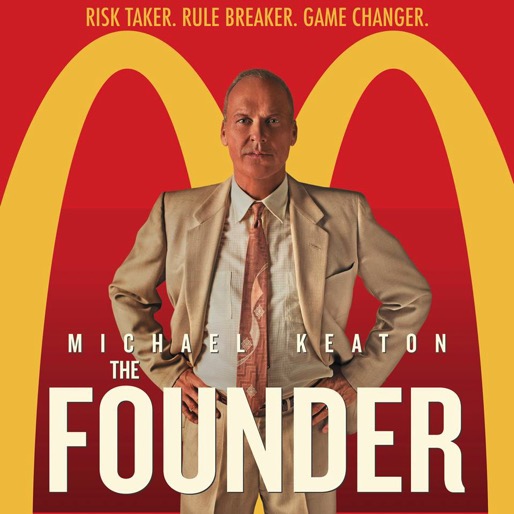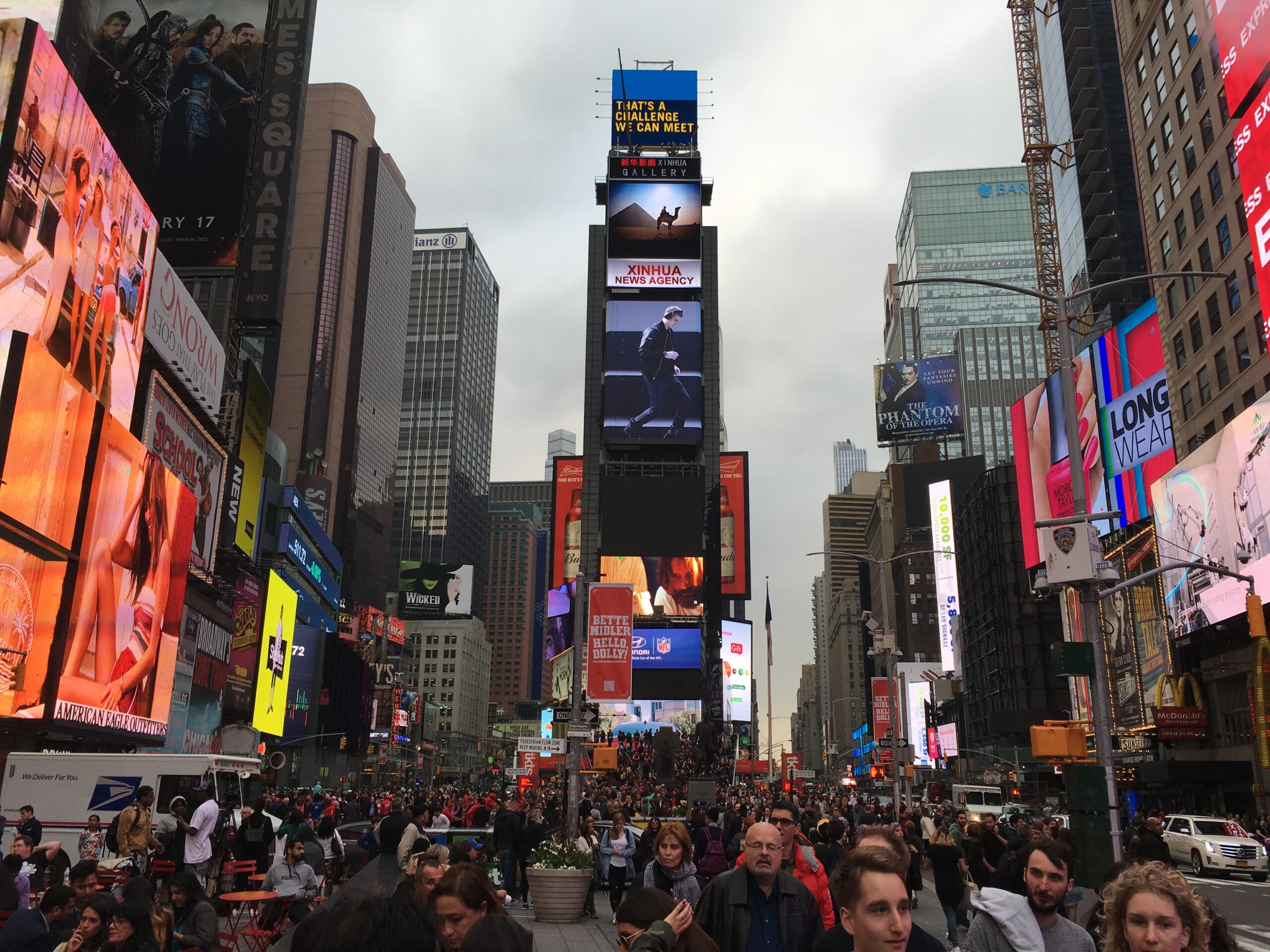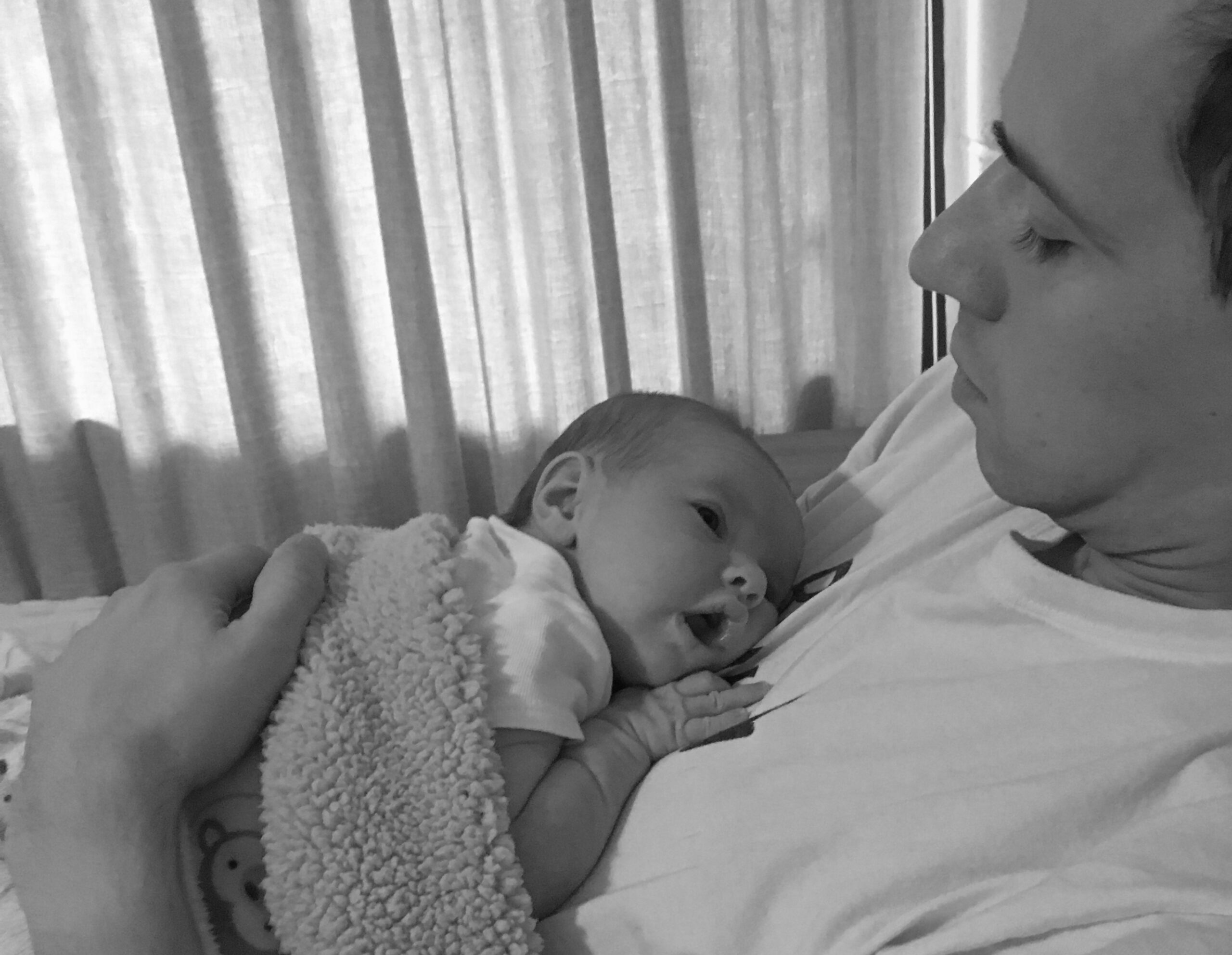 I was recently in New York City one evening doing some book promotion and I happened to walk through Times Square with its bustle and crowds. It’s a captivating place, bright as daylight with ginormous screens and billboards. On the top of One Times Square is the famous New Year’s Eve ball with “2017” lighted up beneath it, celebrating what all New Years celebrate: hope for our future. I turned to look at the thousands of people in the square and I had this meditative moment that was very much like the meditation on the Incarnation, where the Trinity gazes at all the goings on in the world. I stood and gazed at the crowds, full of people from around the world, some local, some visiting, some eating hot dogs or waiting in line for theatre tickets, others shopping or snapping photos. As I looked around at these people and the bright screens and lights, I realised that what drew these tourists to this place were the bright advertisements that covered every building. Then there were the fake Disney characters that insist on a payment after taking a photo with them. It was consumerism. And for a moment I felt saddened at how much retail and materialism controls our lives, how much it distracts and takes over. Perhaps in the spirit of Ignatius’ meditation, the Trinity sees some continued need for our collective redemption.
I was recently in New York City one evening doing some book promotion and I happened to walk through Times Square with its bustle and crowds. It’s a captivating place, bright as daylight with ginormous screens and billboards. On the top of One Times Square is the famous New Year’s Eve ball with “2017” lighted up beneath it, celebrating what all New Years celebrate: hope for our future. I turned to look at the thousands of people in the square and I had this meditative moment that was very much like the meditation on the Incarnation, where the Trinity gazes at all the goings on in the world. I stood and gazed at the crowds, full of people from around the world, some local, some visiting, some eating hot dogs or waiting in line for theatre tickets, others shopping or snapping photos. As I looked around at these people and the bright screens and lights, I realised that what drew these tourists to this place were the bright advertisements that covered every building. Then there were the fake Disney characters that insist on a payment after taking a photo with them. It was consumerism. And for a moment I felt saddened at how much retail and materialism controls our lives, how much it distracts and takes over. Perhaps in the spirit of Ignatius’ meditation, the Trinity sees some continued need for our collective redemption.
 In my moment of meditation, noticing the snapping pictures and the carrying of shopping bags and the thirty-foot ads, I knew that a Star-Trek-like utopian society which has moved beyond the need for money or possessions was not anywhere near becoming reality. What hopeful future does the Times Square New Year’s ball truly represent? The advertisements covering Times Square represent a human desire for something deeper, which products never fulfil. We yearn to fill our restless hearts. But we think that things will satiate that restlessness and so we actually sacrifice relationships for those things. During my travels I overheard two businessmen talking about how you have to be a “bulldog” in business, doing whatever it takes to increase sales and earn that profit. Sometimes this sadly means sacrificing human dignity or family. For some, profit-making and wealth-building become their life’s focus. The recent film The Founder tells the story of Ray Kroc who founded the McDonald’s empire. A humble travelling salesman trying to earn an income for his family turns into smug and prideful entrepreneur who essentially steals the name and business from the McDonald brothers. At one point he envisions McDonald’s as the new “American church”. His initial desire for McDonald’s to be a symbol of family and togetherness turns into a greedy desire for profit, and his own family relationships die as he distances himself from his wife who does not share his passion for business. One evening while eating dinner in silence he simply says, “I want a divorce.”
In my moment of meditation, noticing the snapping pictures and the carrying of shopping bags and the thirty-foot ads, I knew that a Star-Trek-like utopian society which has moved beyond the need for money or possessions was not anywhere near becoming reality. What hopeful future does the Times Square New Year’s ball truly represent? The advertisements covering Times Square represent a human desire for something deeper, which products never fulfil. We yearn to fill our restless hearts. But we think that things will satiate that restlessness and so we actually sacrifice relationships for those things. During my travels I overheard two businessmen talking about how you have to be a “bulldog” in business, doing whatever it takes to increase sales and earn that profit. Sometimes this sadly means sacrificing human dignity or family. For some, profit-making and wealth-building become their life’s focus. The recent film The Founder tells the story of Ray Kroc who founded the McDonald’s empire. A humble travelling salesman trying to earn an income for his family turns into smug and prideful entrepreneur who essentially steals the name and business from the McDonald brothers. At one point he envisions McDonald’s as the new “American church”. His initial desire for McDonald’s to be a symbol of family and togetherness turns into a greedy desire for profit, and his own family relationships die as he distances himself from his wife who does not share his passion for business. One evening while eating dinner in silence he simply says, “I want a divorce.”
How does God feel when witnessing moments like this? Does God’s heart break when the drive for wealth and possessions consume our lives? Perhaps The Founder movie was on my mind when I looked at Times Square and called it the American Cathedral of Consumerism. Religion, which is supposed to be about transcendence and loving relationships, becomes a religion of consuming. Ignatius might say this is a sign of the evil spirit working, deceiving our hearts into believing that money and things are all we need. Studies have shown that our preoccupation with what seems to be missing in our lives (money, power, friends) actually makes that scarcity worse.
What then can we hope for? The good spirit is constantly trying to remind us that healthy relationships are the source of satisfaction in life. We all know the joy of laughing with friends and having moments of intimacy and quality time with loved ones. The desire for healthy relationships is also very natural for us. We know the sacrifices we are willing to make for those we love. Still, material things can come in the way. But as Ignatius says in his Suscipe prayer, all the things we have are gift, and all we need is God’s love and grace. If we put the same energy into our relationships with God and one another that we put into buying and selling, the world might be a better place.
Listen to the podcast version of this post…









You were in nyc and didn’t message me??! lol